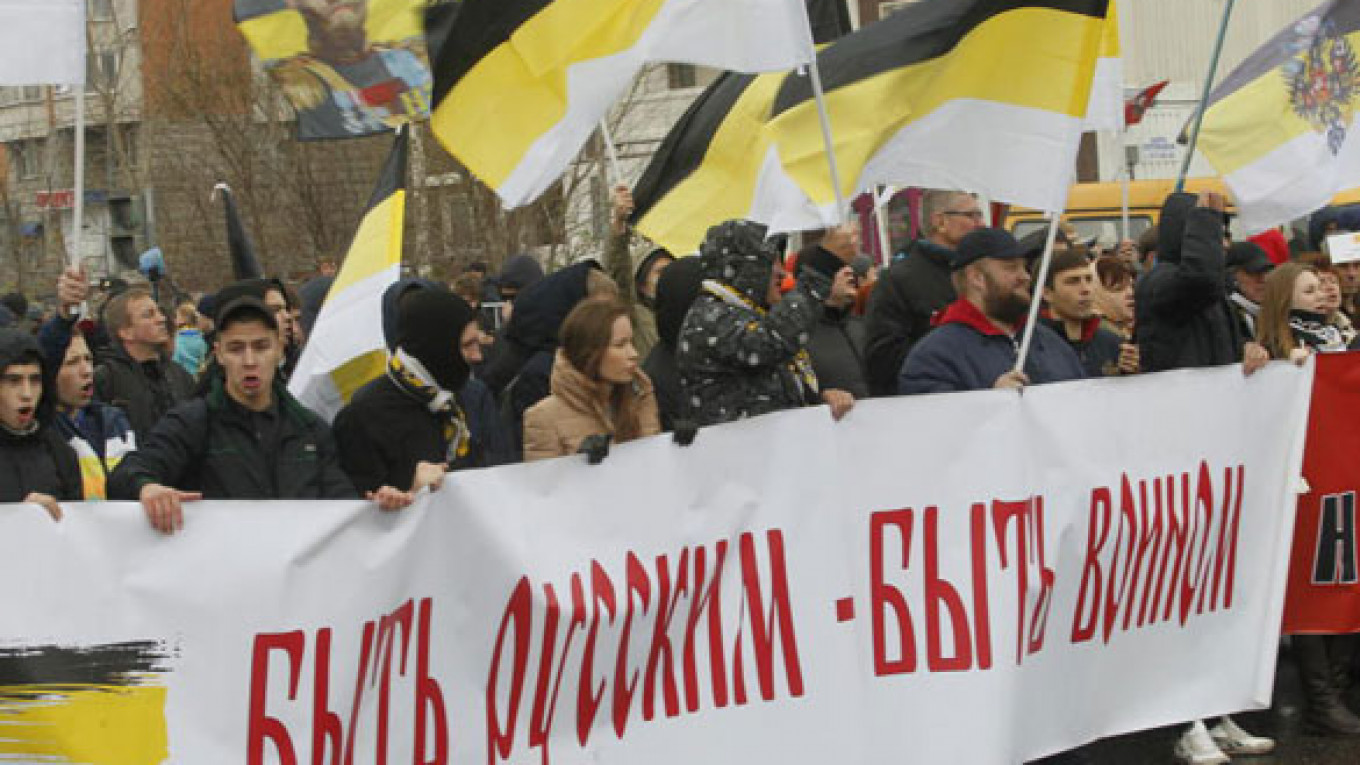Russia has seen an increase in violence motivated by ethnic hatred and physical attacks on the LGBT community in the past year, experts said Thursday.
The topic has taken on a new sense of urgency in light of Russia's anti-gay propaganda legislation and the ongoing street protests in neighboring Ukraine, protests which are now in their third month and took a violent turn in recent weeks as nationalists began to dominate. Observers have expressed concerns that the nationalist sentiment in Kiev could bleed over into Russia.
Judging from conclusions presented in a report by analysts from the Sova Center, a think tank monitoring racism, the public's anti-migrant sentiment will probably not lead to large-scale protests, however.
Although "the potential support" of the ultranationalist movement "grew considerably," the movement itself "took a step back to existing in the form of half-legal radical cells," the report said.
"In such a course of development, ultranationalists will hardly be able to attract a really considerable number of new supporters from xenophobically oriented Russians," the report said.
Murder cases motivated by ethnic hatred rose from 19 in 2012 to 21 last year, but the overall number of attacks provoked by racial intolerance dropped from 210 to 199 in the same period, according to statistics contained in the report, which was paid for with a presidential grant.
The trends seen in 2013 developed against the background of a drop in the number of prison sentences for ethnic violence and a surge in convictions for hate speech on the Internet, Vera Alperovich and Natalya Yudina, the co-authors of Sova's 2013 report on xenophobia and radical nationalism, told some 30 journalists at a news conference Thursday.
The rise in attacks stems from anti-migrant and anti-LGBT policies enacted by the country's leadership, they said.
"In 2013, we saw an outburst of street activity," Alperovich said.
"The majority of it was due to an artificially created situation — the fact that authorities started playing the nationalist card," she said, referring to raids by police on markets across the country last summer and fall, as well as President Vladimir Putin's idea in late 2012 to introduce passports for migrants from CIS and Central Asia.
The anti-migrant campaign of the authorities intensified last summer with raids on markets across the country in August following the rape of a teenage girl in Moscow in late July. The crime was blamed on a Dagestani native working at Matveyevsky Market in western Moscow.
After the suspected rapist's relatives severely beat a policeman when he tried to detain the suspect, police responded with a barrage of raids on open-air markets and city officials called for tighter migration policies.
In October, residents of the Moscow district of Biryulyovo Zapadnoye went on a rampage in a local shopping mall that employed migrants after the murder of a local man was blamed on an Azeri national said to work there.
According to Yudina, such incidents showed the nationalists "crossing over to the more defenseless" members of the community, as opposed to "political, ideological and social opponents."
The number of people injured in attacks fell from 191 in 2012 to 178 last year.
Although the decline in the overall number of attacks could be taken as a good sign, the report's summary called the two extra murder cases last year a "considerable outburst of ethnic violence."
After the news conference, Yudina told The Moscow Times by phone that the figures presented were not final and more cases of last year's ethnic violence may still be detected later.
In the four years preceding 2013, Sova registered a decline in violent crimes motivated by hatred, with 537 victims, including murdered and injured people, in 2009 and 210 in 2012.
Sova's statistics are based on legal convictions that its experts managed to track down, and it is "only the tip of the iceberg," Yudina said.
"It does not at all reflect real figures, we can only more or less assess the dynamics, thanks to permanent methods," Yudina said.
The LGBT community became an "important group of victims" of violent attacks last year, Yudina said. Two people suspected of being gay were killed last year and 25 beaten, Sova's report said.
Yudina also said that a law introducing fines for the promotion of nontraditional sex among minors, which took effect in July, contributed to the growth of public intolerance against the LGBT community.
Despite the surge in hate attacks, the prosecution of such crimes became more relaxed.
The number of suspended sentences for physical attackers grew to 20 percent. On the side of it, the number of convictions for promoting hate crimes grew from 91 in 2012 to 131 last year, the report said. Of last year's convictions, 101 were handed down for information posted on the Internet.
Contact the author at [email protected]
A Message from The Moscow Times:
Dear readers,
We are facing unprecedented challenges. Russia's Prosecutor General's Office has designated The Moscow Times as an "undesirable" organization, criminalizing our work and putting our staff at risk of prosecution. This follows our earlier unjust labeling as a "foreign agent."
These actions are direct attempts to silence independent journalism in Russia. The authorities claim our work "discredits the decisions of the Russian leadership." We see things differently: we strive to provide accurate, unbiased reporting on Russia.
We, the journalists of The Moscow Times, refuse to be silenced. But to continue our work, we need your help.
Your support, no matter how small, makes a world of difference. If you can, please support us monthly starting from just $2. It's quick to set up, and every contribution makes a significant impact.
By supporting The Moscow Times, you're defending open, independent journalism in the face of repression. Thank you for standing with us.
Remind me later.






